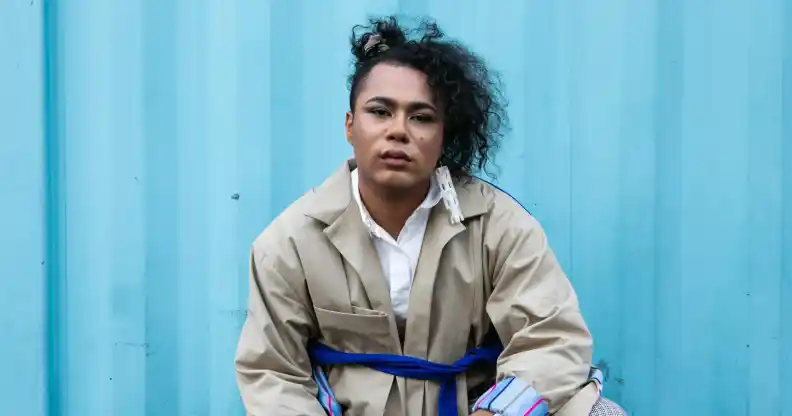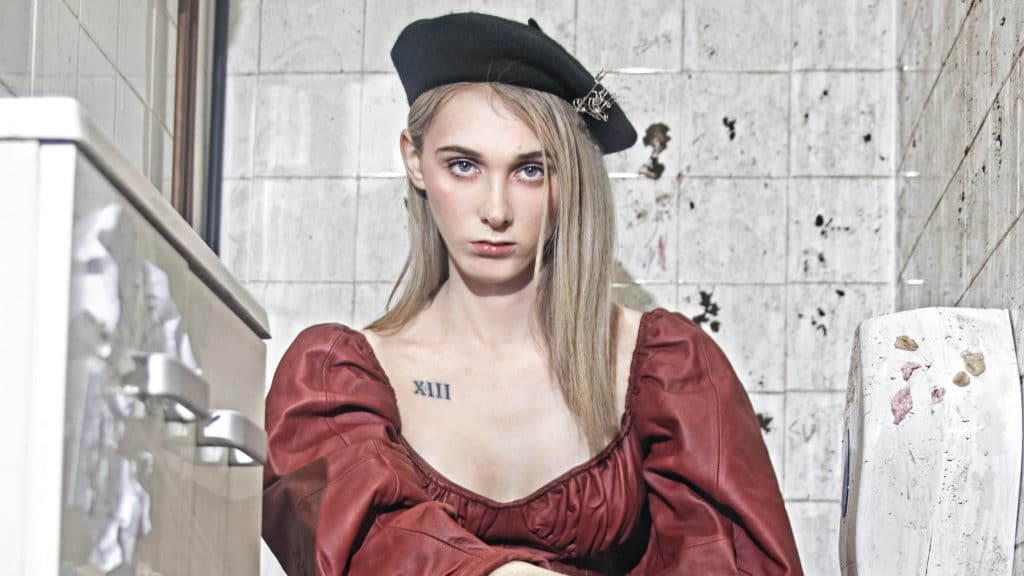Travis Alabanza and actress Reece Lyons embark on ‘devastating’ tour of women’s bathrooms in vital new play

Travis Alabanza’s new play, Overflow, is a ‘hilarious and devastating tour of women’s bathrooms’. (Leviticus Hinds)
Travis Alabanza, the writer, performer and theatre-maker, has a new play coming out: Overflow will show in London next month. Here, they interview their lead actress, Reece Lyons.
Over lockdown, I could not believe that – despite a literal global pandemic, an uprising against racialised police brutality, and a tip of another recession – people were still deciding to argue and debate trans lives and spaces.
I saw a tweet come up about bathrooms and the fear of trans people in them, and it made me think of how one-sided the conversation around fear and danger is – but it also made me think about bathrooms. The great times had in them, the lessons learned, the trials – and out came the play Overflow.
I’m so excited that a story putting trans people front and centre is re-opening the Bush Theatre, and one of the many reasons is because it meant that we could cast Reece Lyons to play the lead, Rosie.
With this being Reece’s first main role in a major theatrical credit, I wanted to sit down with her and get to know her a bit. To speak about Overflow, her journey with acting, and what it is like to be trans within this industry….
Travis Alabanza: Hey Reece, so the basics, what is your age, where are you from?
Reece Lyons: I am 22 – just turned!. And I am from Islington, in North London.
I’m Zooming into rehearsals, rather than being there in person, so I’ve missed all the annoying get-to-know-you drama games with that I lowkey love. So, please tell me, what is your favourite meme?
My favourite internet meme has to be the old but gold classic “my pussy pops severely and yours don’t” vine.
Reece, what brought you to audition for Overflow, and what about the script made you want to take on the role?
So, I got a self-tape through for Overflow from my agent, and then I think the next day the open call for auditions was posted on social media and I woke up to about seven or eight notifications (which for me is a lot, OK), all encouraging me to go for it.
It almost kind of felt a bit like a universal sign that I was, seemingly very clearly, being nudged to listen to. From that point on, it was challenge accepted.
I also would be lying if I said that Travis Alabanza, you and your presence in this process (being the writer of the show), did not have a hand in drawing me in. I had been following your work for quite some time before this point and always looked up to you, and not just from the obvious perspective of trans artist to trans artist, but mainly just from one human being to another human being.
I think that you’re incredible, period. Seeing your name on the casting and the thought of working with you was not only an exciting prospect to me, but was also just so relieving? I don’t want to give too much away at this point, but there is such a depth of lived experience that exists within Rosie’s character and words that I relate to and connect with, that for me, taking on this role was such a simple and easy ‘yes’.
Why do you think audiences should come and see Overflow?
I don’t only think, I know, that it is very important for audiences, particularly British audiences during this time, to come and see a show like Overflow because trans people – and, more often than not, trans women/trans feminine people – are made into such spectacles that we are seen as concepts rather than actual human beings. Whether that’s by the press, social media, your friends, your colleagues, your own unconscious bias, this country’s colonial history, or perhaps even your ex-favourite childhood author.
It constantly feels like there is an unwanted gaze on us. And what Overflow is doing is giving a, primarily cis, audience a taste of what the impact of that gaze does to a person, and to her livelihood, her interpersonal relationships, her friendships, her attitude towards public space, and what it feels like to want to have the right to just fucking exist without constantly being harassed or othered or tiptoed around in some kind of way or another, all of the time.
You play Rosie, you’re still just getting to know her a bit, but how would you describe her in three words to someone trying to spot her in a bar?
Grungy, no-nonsense and TALL – I’m 6’1″.
You’ve had a week in the Overflow rehearsals now, what is one thing that has happened that you didn’t expect?
I didn’t expect to have my capabilities and potential as an actor pushed as hard as I am being pushed by the creative team behind this show, who are all fabulous by the way, and I didn’t expect to respond in such a surprising way? For example, I’m doing and learning things throughout the rehearsal process from vocal techniques to movement direction where I’m like, “Wow, I have literally never been told I could do that as a performer before, so I never thought I was capable and so I have just never tried.”
And I’m only just realising now how fucked up that is. I think that isn’t even a self-defeat thing, I think that’s a case of what it currently feels like to be a trans woman within the theatre industry and how little encouragement, opportunity and training we are used to receiving.
I never went to drama school. But, I hope that this show will be able to shift things in the right direction and show people, especially other trans people, that actually it is possible for us to be taking up lead roles in these theatres and it is possible for us to be accepted into whatever drama schools/institutions/rehearsal spaces/fancy rooms that we want to be in, and not out of an act of tokenism either, but because we actually do deserve to be in them in the first place, and the gag is we always have done.

Reece Lyons plays the lead in Overflow, the new play from Travis Alabanza. (Supplied)
I would say it is still very rare to have a trans person, particularly a trans woman, in a lead role on the main stage of a theatre like the Bush. How does that feel? Does your transness come into this moment, or not?
I still can’t really believe that this is still seen as an issue or is to be considered a “recent achievement” for this industry (but disappointingly I also can), and I really, really wish I didn’t have to see it like that and I actually refuse to.
For me, I’m here because I am a f**king truthful actor. I also worked my ass off to get to this point. It doesn’t really feel like my transness comes into it only because I don’t want to pigeonhole myself, which unfortunately is a big issue for a lot of trans performers, being pigeonholed into only playing roles which are an exploration of our gender.
Don’t get me wrong, I love playing trans characters and I think it’s vital that trans characters are cast authentically and played by trans people, but in the wider scope of my future and of my career, I don’t want to just play trans characters. I want to play cis women, I love classical theatre, I adore Shakespeare – my dream role is to play Lady Macbeth at The Globe someday.
I don’t see how my or anyone else’s gender identity comes before our talent or passion for our craft. That would be like someone hypothetically criticising me for accepting this role and saying that “I only got this role because I was trans”. But by proxy, that logic then assumes that every single person who is trans is able to act, and that is not definitely not the case. Therefore, surely it’s the talent/dedication/hard work/alignment of a person that comes first, and that their identity comes into it at some point much later down the line, if at all.
What is it like working in the industry? We are two trans people working within it, I have so many thoughts on how the industry exists with transness, I’m wondering if you have any?
I could literally talk about this all day long and I think I have shared a lot of industry thoughts throughout the rest of this interview in other places, however, I will say this: Working in this industry as a trans person can feel very lonely and isolating at times, and I cannot overemphasise, Travis Alabanza, how fucking brilliant – and funny! – it is to work with you.
Just to feel a fellow trans presence in the room, even if it is currently over Zoom, is so refreshing. It’s feels like a welcoming home, like a doormat that says, “You’re not the only person like you here, and that actually, if you crack that really niche, queer, trans joke, or reference that specific meme in this moment, that there are people here in this room, right now, that will get it and genuinely laugh with you.” And I think that is beautiful.
A super light question to end on, what are your hopes for the future of theatre and live arts?
I hope we can, eventually, get to a place where coronavirus is under control again, so that one day the theatre industry can come back stronger than ever. And that once the industry is back in full swing, I want to see more joy on stage.
More trans joy. More Black joy. More queer joy. More working-class joy. More feminist joy. More intersectional joy. More post-show smoking-area joy.
Any type of joy you can think of, just pure, unfiltered, theatrical, joy.
Overflow by Travis Alabanza is directed by Debbie Hannan and will run from the 8-22 December 2020 at the Bush Theatre in London. Tickets are priced from £20 (concessions available) and can be booked at bushtheatre.co.uk or at the Box Office on 020 8743 5050.

